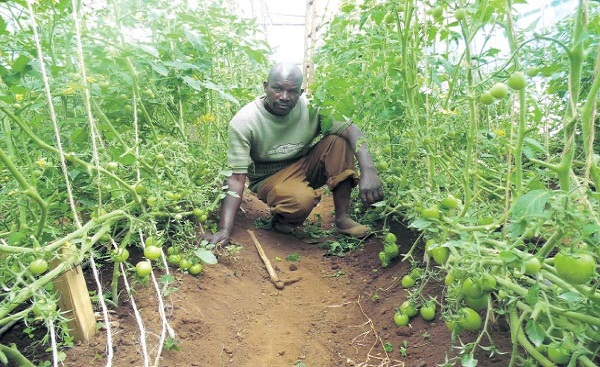What usually comes to mind when one talks about farming is a large tract of land.
However, did you know that you do not need a large piece of land to grow different crops and make good income?
Daniel Ruto, a farmer in Silibwet, Bomet County, has proved that with even half an acre, one can make as much money as someone who has over five acres. Ruto grows vegetables and tomatoes in greenhouses on his farm that has been christened Evergreen Garden because of its ability to produce different kinds of vegetables all-year round.
But what makes the farm stand out is that the farmer uses a small greenhouse measuring about 18 by 6 metres that he constructed himself last year after growing tomatoes in an open field for some time.
He says that he built the greenhouse himself, save for the polythene covers and the drip irrigation pipes.
“I bought the polythene covers for Sh42,000 from Kericho town and thereafter constructed the greenhouse myself.” He tells Seeds of Gold that constructing a greenhouse is not that hard. According to him, one does not need special wood to make a greenhouse. He constructed his with eucalyptus and wattle poles.
“Once you have the specifications from a professional greenhouse plan from agricultural extension officers, it is easy to construct a greenhouse. The parts made of wood can be sourced cheaply,” he says.
Inside the greenhouse, the farmer has planted 1,200 tomato plants that are about to mature. During the first season last year, he planted the same number of tomatoes and earned about Sh100,000. The second season gave him more cash.
“When I first begun, I used a watering can to water the tomatoes and the yields were not as good. I then acquired a drip irrigation system last season,” he says.
A single tomato plant earned him an average of Sh200 in six months and the small greenhouse gave him up to Sh240,000.
“I expect to earn at least a similar amount or more this season because I keep on improving my farming methods,” he says.
The innovative farmer treats the soil in the greenhouse using ash to allow him to plant tomatoes on the same plot repeatedly without the risk of transferring diseases.
He tells Seeds of Gold that he mixes soil with ash, charcoal powder and manure and then replants tomatoes on the same soil with good results.
However, Bomet County Director of Agriculture Johnstone Rono cautions against using the method because it is not scientifically proven.
However, he agrees that farms need to be sterilised before a new crop is planted in a greenhouse but only if it is necessary because other practises like crop rotation helps break the cycle of pests and diseases.
“If need be, one can steam or bake the soil to ensure that it is sterilised, but crop rotation is economical,” he says.
According to Rono, hygiene in the greenhouse also plays an important role to ensure that the facility is disease-free. Ruto does not only concentrate on the greenhouse, he also raises different seedlings that he sells to farmers at Sh5 each.
He grows cabbages, sukuma wiki (kale), tomatoes and beetroot seedlings. He has sunk two wells, which supply water to the farm. The water is pumped into a raised tank before flowing by gravity to the seedbeds and the greenhouse.
The proceeds from his farm have enabled Ruto to educate his children, the eldest completed high school last year.
He has also bought a motorcycle that he uses to ferry his produce to the market.








